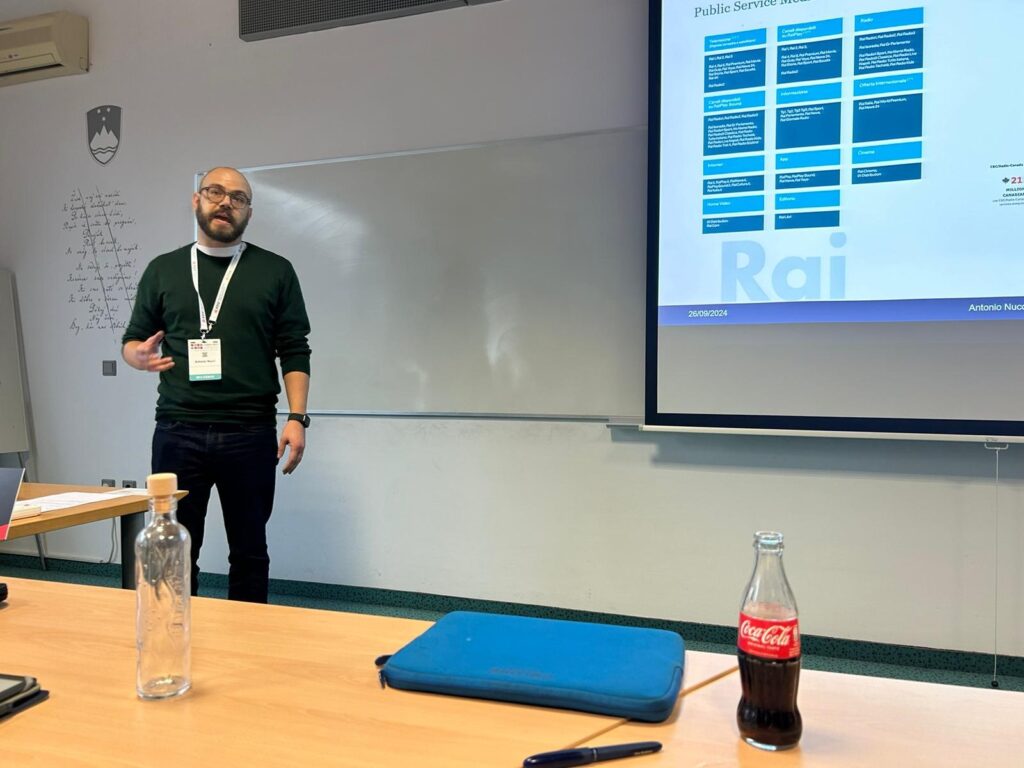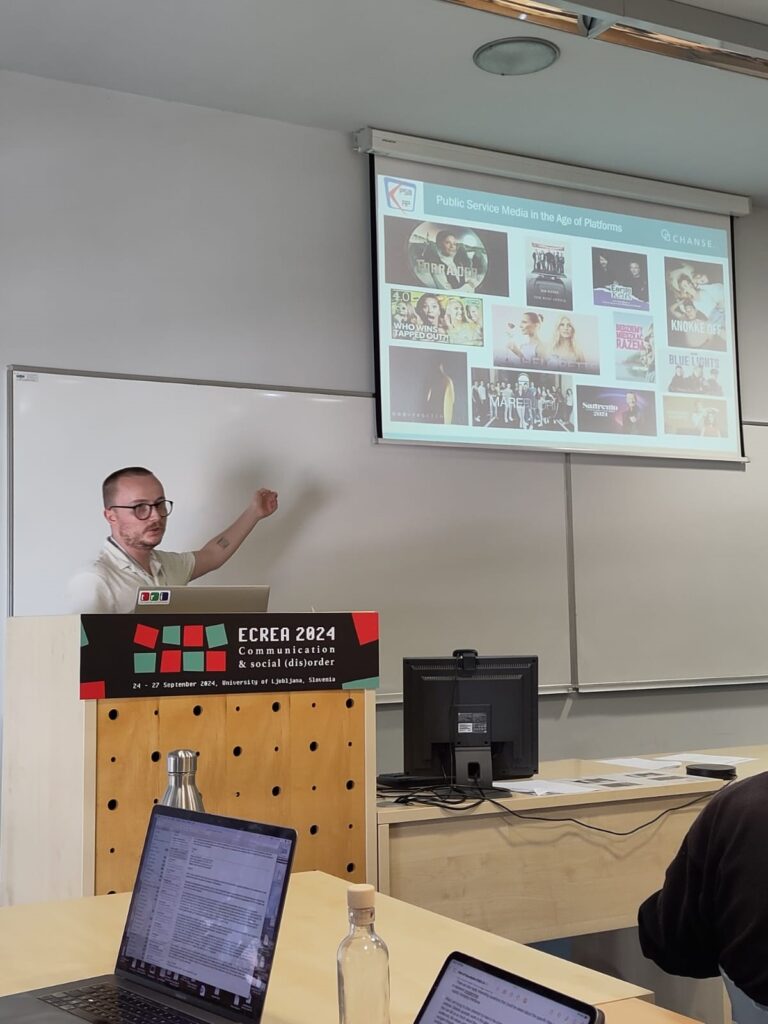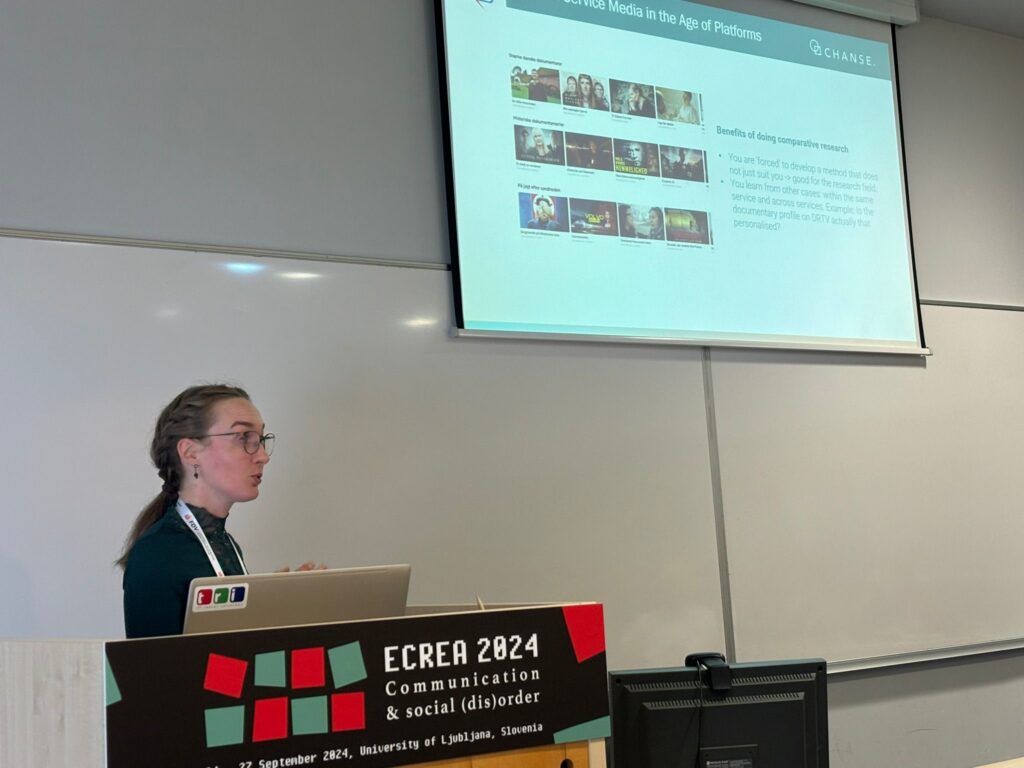For the 10th ECREA conference in Ljubljana, Slovenia, which took place from 24-27th September 2024, members from our PSM-AP team presented as part of a panel titled Comparative Approaches to Public Service Media Disruption: The Transformation of Values, Norms and Prevailing Structures in the Age of Platforms as well as the round table Re-conceptualising the television ‘text’ for the platform age: textual analysis, texts and interfaces.
Chaired by Tim Raats, the panel included Catherine Johnson, Julie Mejse Münter Lassen, Catalina Iordache, Antonio Nucci, Michal Głowacki, and Dan Martin. Since this presentation was at the half-way point of our three-year project, when we have undertaken most of the primary data collection, the panel showcased the different forms of analysis possible by bringing together our multi-level and cross-country comparative approach. The panel took place on Thursday, September 26th from 14:30-16:00.
The following day our round table took place in the afternoon. The round table consisted of project members Julie Mejse Münter Lassen, Tim Raats, Catalina Iordache, and Dan Martin, with Catherine Johnson the chair. The aim of the roundtable was to stimulate and contribute to debates about the conceptual and methodological challenges and approaches required to understand and examine television as a text in the context of the rise of streaming and global video-on-demand platforms.
The Panel – Comparative Approaches to Public Service Media Disruption: The Transformation of Values, Norms and Prevailing Structures in the Age of Platforms.
The first paper during the panel was presented by Julie Mejse Münter Lassen. Titled Navigating dilemmas and striking a balance: PSM VODs and personalisation practices in five markets, the paper provided a cross-country comparison of the use of personalisation within PSM video-on-demand (VOD) services. The focus on a single method – a distant reading of the interfaces of six case study PSM VOD services that utilise personalisation – enabled this paper to examine the factors that shape the very different ways in which personalisation is enacted within each service.
The second paper, titled Balancing the scales between public service algorithms and editorial curation, was presented by Catalina Iordache and Catherine Johnson. As public service media shifts to digital-first strategies, challenges are raised for reaching public remits, and particularly principles of universality, accountability, and diversity. Taking a multi-method approach to examine the discourses and practices of two countries – the UK and Belgium – the paper focused on ‘public service algorithms’ aimed at countering threats of polarisation and the creation of filter bubbles, while engaging with audiences.


Antonio Nucci delivered the third paper on the panel, titled Analysing Inclusion in Italian and Canadian PSM. Drawing on analysis of policy documents, interviews and interfaces, this paper interrogates why CBC (Canada) and RAI (Italy) take very different approaches to the value of ‘inclusion’. Taking into account the similarities and differences between the two countries, the paper aims to answer what is meant by ‘inclusion’ by the two PSMs and how does this term find its practical application on their VOD services?
Following this Michal Głowacki discussed the societal and political polarisation surrounding public service media in Poland. In a paper titled Reinventing Polish PSM for the Age of Platforms: Qualitative Approach to a Transitional Case Study, the paper focused on the case of Telewizja Polska (TVP) as a transitional case study, and how discussions have centred around societal polarisation rather than modernisation of PSM regulation and organisation.
The final paper in our panel was delivered by Dan Martin, with the title Representing PSM Values in the Platform Age: Comparative Analysis of Programmes across Markets. Returning to a single method, cross-country analysis, the paper focused on the question of how to undertake highly qualitative textual analysis of programmes comparatively across the six case study countries represented within our project.



The Round Table – Re-conceptualising the television ‘text’ for the platform age: textual analysis, texts and interfaces.
Drawing from projects experimenting with different methodological and conceptual approaches to understanding television in the age of platforms, the roundtable aimed to stimulate wider discussion and debate about how we conceptualise the television ‘text’ and what this might mean for the methodological approaches required to study television in the platform age. The roundtable began by discussing the various methodological challenges of analysing the interfaces of VOD services. It debated what questions we should be asking through interface analysis, interrogating the value of qualitative and quantitative approaches, exploring the challenges of addressing personalisation, and discussing the extent to which such analysis requires collaboration with computer scientists in order to understand the impact of algorithmic recommender systems.
With the increased globalisation of television, it becomes increasingly important to develop methods that seek to understand these processes at a transnational level, whether to explore the differences between national versions of transnational services (such as Netflix) or to examine nationally specific responses to transnational phenomena (such as platformisation). To address this, the roundtable examined the challenges of undertaking comparative textual analysis of interfaces and programmes at scale (Pietaryte and Suzina 2023). It debated the benefits and challenges of bringing textual analysis of interfaces into dialogue with other qualitative methods, such as interviews and document analysis, including the challenges of data overload and achieving a balance between explanatory relevance and contextual equivalence when researching across different national case studies. Finally, it asked how we might utilise textual analysis of both programmes and interfaces as a comparative method at scale. To what extent is a method typically focused on close reading of a small number of texts adaptable to the demands of larger-scale cross-country comparison?





Further ECREA Details
We had a great time presenting our panel and round table at Ljubljana in September 2024. It was great meeting colleagues and seeing other presentations during the event.
To learn more about the ECREA 2024 conference ‘Communication & social (dis)order’, visit https://ecrea2024ljubljana.eu/. The programme for the event is available at https://c-in.floq.live/event/ecrea2024/Landing.
